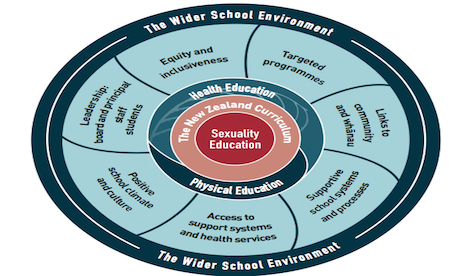Some Secondary school principals have been left feeling uneasy after Family Planning presented a session called Taming Terrifying Topics at the Physical Education NZ 2015 conference in Hamilton on Monday.
The subtitle for the session was “teaching pleasure within your sexuality education programme.”
At the conference teachers were shown pamphlets that said sex talks should include a discussion about pleasure.
“There is a fear of talking about pleasure,” it said.
Family Planning health promoter Vicky Burgess-Munro said traditional sex education focused on “negative findings” like avoiding pregnancy and sexually transmitted infections.
She said research in 2005 by New Zealand-based Louisa Allen showed pupils were looking for a more positive view of sexuality.
“They were sick of being told just the basics … They wanted to know how to be good lovers, how to get the most, and most positive, out of their relationships.”
Some secondary school principals have been left feeling uneasy.
Christchurch Boys’ High principal Nic Hill said it was “interesting ground” but he could not imagine his staff wanting to “get in to technique.”
“I’m a little surprised. I don’t think that will be happening at Boys’ High.”
Burnside High School principal Phil Holstein, who is also Canterbury Westland Secondary Principals’ Association chairman, said he did not feel comfortable with the advice and he was sure his teachers would feel the same.
“Nor is it appropriate in the form of the health syllabus. I don’t think it was ever intended that those things be discussed.”
Family Planning provides a range of services to schools, including co-teaching, teacher professional development and resources.
The Ministry of Education recently overhauled its sexuality education guidelines for the first time in more than 10 years. Sexuality education: a guide for principals, boards of trustees, and teachers was released in May.
At the time, student achievement deputy secretary Graham Stoop said schools wanted to be able to give students with the right skills to navigate relationships and keep themselves safe.
Sexuality education is a compulsory part of the health curriculum but schools are free to decide how they teach it.
They do this in consultation with their school community and must consult every two years.
Source
- stuff.co.nz
- stuff.co.nz
- Image: penz.org.nz
